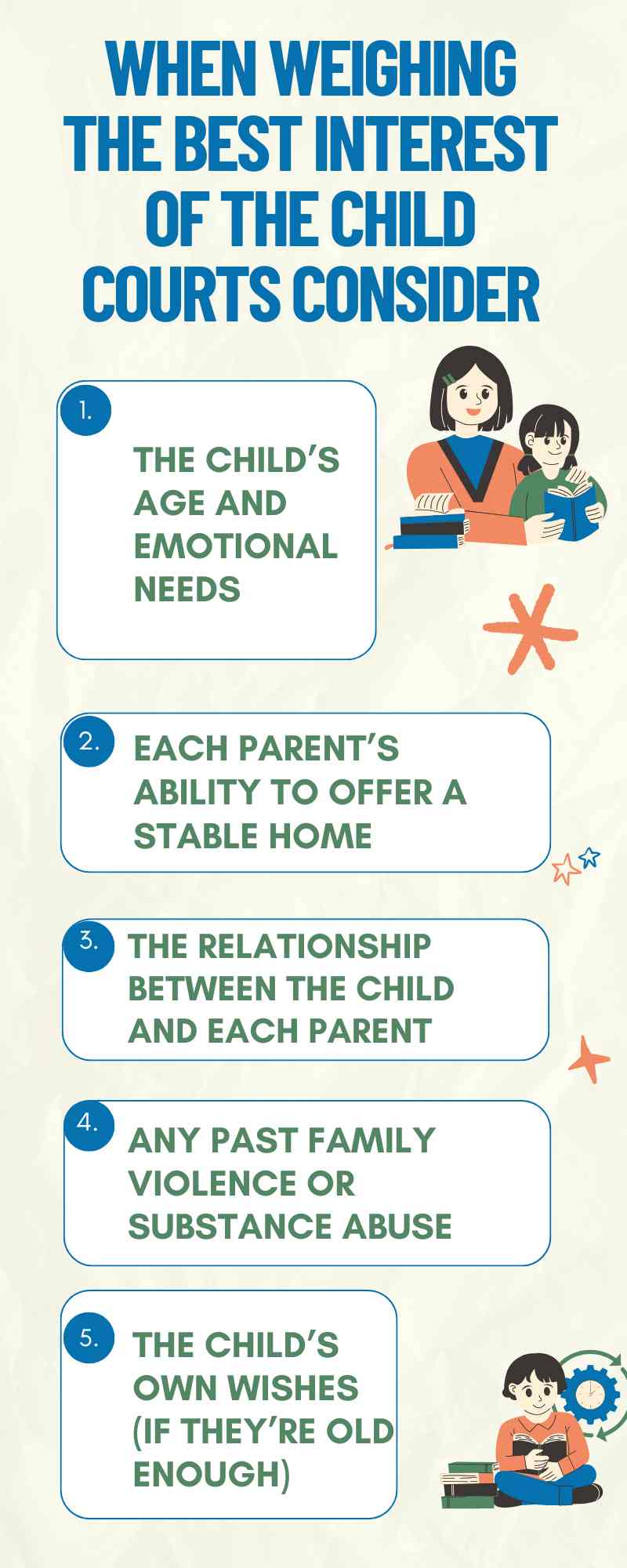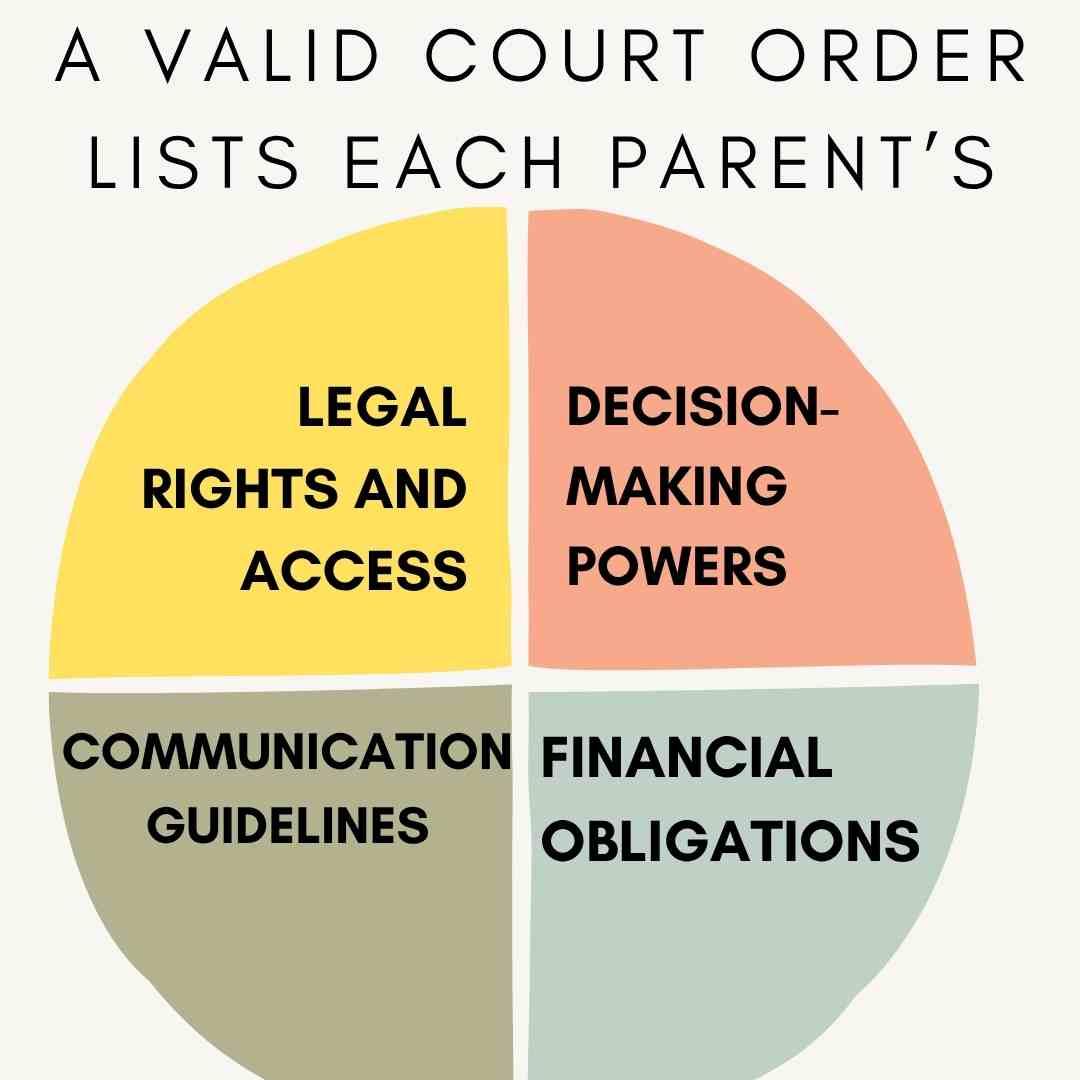As a family law attorney practicing here in Texas, I’ve helped many parents like Daemon understand their legal rights. As an unmarried father, he wasn’t sure of his rights but when the mother of their children showed signs of neglect, he called me.

“Chris, I need help. My old girlfriend, the mother of my kids—there’s something not right with her. She’s not taking good care of the kids,” he said.
“Is this new?” I asked.
“Well not really, but it’s much worse. I’m the father, but we were never married. And well, she wanted the kids, so when we split up, I just left, and allowed her to have them. I grew to love them, and it was sad, but it seemed best,” Daemon explained.
“Have you seen them much since?” I asked.
“Sure at the start. I’d take them out once or twice a week. Nothing formal. It was all cool. But recently, she hasn’t returned my calls or any messages. And she’s seeing this new guy. I think they’re drinking a lot—partying. Even leaving the kids home alone once they fall asleep to go out.”
“How do you know?” I asked.
“One of her friends told me, we’re friends too.”
Daemon, do you have any formal claim to being the father? Are you on the birth certificate or anything?”
“Nope. I thought that might complicate my life.”
When an Unmarried Father Needs to Step Up
“Well if you are ready to complicate your life for the best interest of the kids, we can do that. Please allow me to take you through my guide and help you understand your parental rights. If you are really the father you say you are, you will have your rights,” I told him.
“Thanks Chris. I’m ready.”
Knowing your parental rights is more than just legal talk—it protects the strong bond you have with your child. It also makes sure the child’s best interests come first.
Texas law sets out clear rights and responsibilities for all parents. It assumes both parents should be joint managing conservators. This means the court expects both parents to stay involved in the child’s life.
Texas courts focus on one main goal: the child’s best interests. When parents divorce, the law presumes they should share joint managing conservatorship. This shows how important it is for both parents to be involved.
Whether you’re dealing with divorce, separation, or a paternity case, knowing your legal rights and duties matters. In this guide, we’ll go over custody arrangements, visitation rights, and court orders in Texas.
Key Takeaways
- Texas courts focus on one main goal: the child’s best interests.
- Unmarried mothers start with full custody until paternity is established.
- Establishing a father’s parental rights is crucial for unmarried fathers to gain legal standing and participate in their child’s life.
- Texas technically doesn’t use the word “custody.”
- It’s important to know that child support payments and visitation rights are separate.
Establishing Parental Rights in the State of Texas

Before we look at specific parental rights, let’s talk about how these rights get established in the state of Texas.
Importance of Paternity and the Parent-Child Relationship
For married couples, paternity is usually clear. Both parents are on the birth certificate, and legal rights are automatic. In Texas, courts presume paternity for married couples, meaning the husband is automatically considered the biological father.
But for unmarried parents, the situation needs more attention. Learn more about biological father rights without a TX birth certificate.
Paternity can be established in two main ways:
- Signing an acknowledgement of paternity (AOP) form, often at the hospital when the child is born. Both parents can agree and sign the Acknowledgment of Paternity at the hospital when the child is born.
- Getting a DNA test to confirm biological parentage.
I once helped a father of a child who signed an AOP at birth. Later, he ran into problems seeking visitation rights. Because he had established paternity correctly, we protected his rights despite the mother’s objections. Without that paperwork, it would have been much harder.
For unmarried mothers, it’s easier. Texas law automatically gives them certain rights from the moment the birth certificate is issued. Fathers, however, must take extra steps to secure their legal standing.
Experienced Family Law Attorney: Why You Need One
The family court system in Texas courts can be confusing. Words like “conservatorship,” “possession,” and “access” have specific legal meanings that differ from everyday use.
An experienced family law attorney can:
- Explain your legal rights in simple terms
- Draft valid parenting plan documents
- Speak for your interests in legal proceedings
- Make sure all paperwork follows the legal framework
In Collin County, for example, local court orders can have unique rules that differ from counties nearby. My knowledge of these local practices has saved clients time and money.
Mother’s and Father’s Rights: An Overview
Texas law aims to treat both parents equally, but in real life, unmarried mothers and unmarried fathers can start in different positions.

Mother’s Rights and Responsibilities
Under Texas Family Code section 151.001, both parents share the same parents’ rights and parental responsibilities. Still, an unmarried mother begins with full legal custody by default.
She alone can:
- Make decisions about the child’s education, including school choice and extracurricular activities
- Approve medical care and dental care
- Decide on religious training
- Pick the residence of the child
I once advised a mother who didn’t realize she had a legal obligation to make sure the father’s court-ordered visits happened—not just allow them when she felt like it.
A court order can change these rights based on specific circumstances, especially if the father has established paternity and wants to be involved.
Father’s Rights and Legal Standing
For unmarried fathers, getting parental rights often requires taking legal steps:
- Proving paternity by an AOP or a court-ordered DNA test
- Filing a petition in family court
- Creating a valid custody agreement or visitation schedules
Establishing a father’s parental rights is crucial for unmarried fathers to gain legal standing and participate in their child’s life.
Once paternity is set, fathers can seek:
- Regular visitation rights
- A say in major decisions about the child’s life
- Joint or even primary custody
I recall representing a father who had no access to his child for a year. After proving paternity and showing he was committed, the court granted a standard possession order and eventually joint conservatorship. That means, he became actively involved in the child’s life.
Under Texas law, the non-custodial parent (often the father) has the right to be actively involved in the child’s upbringing, provided it benefits the child’s welfare. We recommend working with an experienced fathers’ rights attorney to help you establish paternity and parental rights.
Best Interest of the Child in Texas Courts
Every decision in Texas courts revolves around the best interest of the child.
Understanding the Best Interest Standard
Instead of splitting time equally or favoring one parent by default, courts decide what best serves the welfare of the child.
Texas courts look at:
- The child’s age and emotional needs
- Each parent’s ability to offer a stable home
- The relationship between the child and each parent
- Any past family violence or substance abuse
- The child’s own wishes (if they’re old enough)
These points follow the “Holley factors,” named after a big case called Holley v. Adams 544 S.W.2d 367 (1976) decided by the Texas Supreme Court. Please see the case for more details. The courts keep their decisions child-focused and prioritize the child’s welfare.

How Courts Weigh Various Factors
Over the years, I’ve seen courts ask for substantial evidence when deciding custody matters. To determine the best custody arrangement, the court considers various factors, such as the child’s needs and the parents’ abilities, to determine the best custody arrangement.
Some of the biggest concerns are:
- Home stability
- Financial capacity to meet the child’s emotional needs and financial support
- Emotional bonds
- Whether the parents cooperate with each other
Family violence is taken very seriously. I had a case where the father had a history of domestic violence. The court only allowed supervised visits until he finished anger management.
The main goal is to give the child a safe, stable, and caring environment.
Case Study: In re C.J.C. and the Fit Parent Presumption
In re C.J.C., 603 S.W.3d 804 (Tex. 2020), the Texas Supreme Court dealt with a custody dispute. The case was between a fit biological father and the deceased mother’s fiancé, who was a non-parent.
The lower court had given the non-parent partial custody. But the Supreme Court reversed that decision. The Court said the father has a fundamental constitutional right to raise his child without too much government interference.
This decision is very important. It says Texas courts must assume that a fit parent acts in the best interest of their child. This applies even in cases where custody is being changed and a non-parent challenges the fit parent.
The ruling makes the legal standing of fit parents stronger in custody fights against non-parents in Texas.
Child Custody and Visitation Rights
In Texas, the words for custody arrangements differ from other states.
Physical Custody and Legal Custody
Texas technically doesn’t use the word “custody.” Instead, it uses:
- Conservatorship (making decisions)
- Possession and access (time spent with the child)
Under Texas Family Code section 153, parents can be named:
- Joint Managing Conservators (share decision-making)
- Sole Managing Conservator (one parent makes major decisions)
- Possessory conservator (usually gets visitation)
Often, both parents share joint managing conservatorship, and one parent can choose where the child lives.
Standard Possession Order and Visitation Schedules
Texas has a standard possession order (SPO) for parents who live within 100 miles of each other. This usually includes:
- 1st, 3rd, and 5th weekends each month
- Thursday evenings during the school year
- Extended time during the summer
- Alternating holidays and spring break
For children under three, courts often create a custom schedule that takes into account development and bonding.

I’ve helped many families adapt these SPO guidelines to match their work hours or the child’s activities. While the standard order works for many, it can be changed if needed to meet the best interests of the child and the family.
Modifying Custody Agreements
Life doesn’t stand still, and sometimes custody orders must change. In Texas, you can modify an order if:
- There’s a significant change in conditions (like a new job or moving homes)
- The change benefits the child’s welfare
- The child is 12 or older and states a preference (though the judge still decides)
Common triggers for a modification include:
- Relocating for work
- A parent’s remarriage
- A parent’s serious health issue
- Evidence of neglect
I helped a father modify a possession and access schedule when his ex-wife moved 80 miles away. We were practical and switched to fewer but longer visits, which cut down on travel but kept quality parent-child time.
Legal Custody and Significant Decisions
Besides time spent with a child, legal custody also covers important choices about the child’s life.
Medical, Educational, and Religious Decisions
Courts in Texas can split decision-making in several ways, allowing parents to:
- Share or divide decisions about medical care and dental care
- Make calls about school and extracurricular activities, which are significant aspects of the child’s life
- Decide on religious training
In a joint custody setup, these rights may be:
- Independent (each parent can decide alone)
- Joint (parents must agree)
- Exclusive (only one parent decides)
These issues can get complicated, especially when parents have differing opinions on medical treatments or which school to choose. I once helped mediate between parents with different religions so they could each follow their beliefs during their own physical possession periods.
Reasonable Discipline of the Child
Parents can discipline their children in a fair way, but Texas law sets limits to prevent abuse. Reasonable discipline of the child:
- Should suit the child’s age and child’s health
- Cannot cause harm
- Must be for correction
- Should avoid emotional abuse
Courts may put discipline rules in custody orders if there’s a history of harsh punishment.
Court Orders and Enforcement in Custody Matters
Court orders are not mere suggestions; they’re backed by the legal framework of the Texas Family Code section.
Legal Framework and Court Orders
A valid court order lists each parent’s:
- Legal rights and access
- Obligation to provide financial support, including child support obligations
- Communication guidelines
- Decision-making powers

These orders follow Texas Family Code section rules and can be enforced by the same court. Ongoing violations might lead to involuntary termination of parental rights in severe situations.
If one parent does not meet their child support obligations, the other parent can take legal action to enforce those obligations.
Enforcement of Court Orders
If one parent violates a court order, the other can:
- File an enforcement request
- Ask the court to find the other parent in contempt
- Request repayment of legal fees
- Seek extra visitation to make up lost time
Punishments can include:
- Fines
- Changing the existing order
- Community service
- Even jail time in serious cases
I usually advise my clients to keep detailed notes of every violation. Judges want to see a pattern of missed visits or withheld time, not just one event.
Child Support and Financial Responsibilities
In Texas, providing financial support is a key part of parental responsibilities.
Calculating Child Support in Texas
Texas uses a simple percentage formula to figure out child support obligations:
- 20% of net resources for one child
- 25% for two children
- 30% for three children
- 35% for four children
- 40% for five or more children
These rates apply to the first $9,200 of monthly net resources (current cap as of 2023). Courts may also factor in:
- Medical care and insurance
- School expenses
- Special (unique needs)
- Each parent’s resources
Impact of Child Support on Parental Rights
It’s important to know that child support payments and visitation rights are separate. A parent can’t:
- Refuse visits because payments are late
- Stop paying support if visits are denied
However, paying support regularly shows a commitment to the child’s welfare and can serve as evidence when asking for more visitation or changes in custody arrangements.
I handled a case where a father kept paying child support on time, even though visits were difficult. This helped him later on when he asked for expanded time with his child.
Finalizing a Custody Order
Putting a custody order in place takes careful planning and correct procedures.
The Legal Process for Approval
Finalizing a custody agreement usually involves:
- Filing the initial petition
- Going to mediation (required in many Texas counties)
- Preparing a proposed order
- Attending a short hearing called “prove-up”
- Receiving final approval by the judge
In contested cases, extra steps can include:
- Temporary orders, which last until the court issues final orders
- Information sharing, called “discovery”
- Expert reports
- A final decision at trial
Staying organized and cooperating with the other parent often makes the process easier on everyone, especially the child.

Stability and Clarity for the Child
A well-written custody order gives the child stability and sets clear expectations for both parents, ensuring a consistent child’s upbringing. It:
- Sets routines so the child knows what to expect
- Reduces fights by explaining each parent’s duties
- Includes ways to deal with disagreements later
In Harris County, where I practice often, judges emphasize that a final order is not the end. It sets the foundation for positive co-parenting in the future.
Conclusion and Next Steps
Knowing your parental rights in Texas helps you protect your connection with your child and looks out for their well-being. Every decision under Texas law is about the best interests of the child, from proving paternity to finalizing custody orders.
From my many years in family court judge settings, I’ve seen how being prepared, keeping records, and getting good legal counsel can really change outcomes. Whether you’re a mother seeking support or a father fighting for visitation rights, you should take these steps seriously.
I suggest you:
- Collect key records about your child and your time with them
- Write up a fair plan for custody arrangements
- Obey any existing court order while you request a change
- Consider mediation before going to trial
Remember that legal advice must fit each person’s situation. The information here is general, so you should talk to a lawyer about your own case.

Frequently Asked Questions
FAQs Regarding: Establishing Parental Rights
How does an unmarried father establish parental rights in Texas?
An unmarried father must first establish paternity. In Texas, the law presumes that a husband is the biological father of a child born during the marriage. This can happen by:
1. Signing an acknowledgement of paternity (AOP) at the hospital or later at a recognized agency
2. Doing a paternity test if anyone disputes paternity
Once paternity is confirmed, the father can ask for conservatorship or visitation rights. Without proof of paternity, he has no enforceable rights—even if he spends much time with the child.
How does paternity testing work for unmarried parents?
A paternity test in Texas usually involves a quick cheek swab from the father and child. It can be:
1. Voluntary: Parents agree to the test and sign the needed forms
2. Court-ordered: A judge orders testing during a child custody case
Results often come back in 2–3 weeks and can be used as evidence in court. After paternity is confirmed, the father can move forward with visitation rights or child custody rights.
In tough cases, I recommend going through the court system instead of a home kit. Court-ordered testing follows strict rules so the results are valid in legal proceedings.
FAQs Regarding: Custody and Visitation
Can a father get sole custody in Texas?
Yes. Fathers can receive sole custody (sole managing conservatorship) if there’s strong proof it serves the best interests of the child. Courts will look for:
1. Excellent parenting history and the parent’s ability to provide a stable environment
2. Evidence that the mother is unfit or absent
3. A stable job, home, and lifestyle
4. Proof of abuse or neglect by the mother
I’ve represented father’s rights cases where dads became primary conservators because the mother had issues with drugs or family violence. Although less common in the past, courts now look more at facts than at any assumptions about gender.
At what age can a child choose which parent to live with?
Texas does not set a specific age that allows a child to pick which parent to live with. Still, courts often listen to the child’s choice once they’re 12 or older. The judge may:
1. Talk privately with the child
2. Consider the child’s wishes along with other factors
3. Make the final decision based on the best interest of the child
FAQs Regarding: Modifications and Enforcement
Can I modify a custody order in Texas?
Yes. You can change custody orders if:
1. There’s a major change in life events (moving, new work schedules, remarriage, etc.)
2. The change is in the child’s best interests
File your request (Petition to Modify) in the same court that gave the original order. Explain what changed and why the new plan benefits the child.
What steps should I take if the other parent violates a court order?
Keep records. This has helped my clients for years. You should:
1. Write down every violation (date, time, what happened)
2. Save all texts or emails about each violation
3. Try talking calmly to fix the problem
4. File a motion for enforcement if violations keep happening
Judges view violations seriously, especially if you have solid proof that it’s a repeated issue.
What if the other parent denies my court-ordered visitation?
If you have a valid court order, the other parent cannot lawfully block your visits. If you’re denied visits:
1. Document all missed visits (dates, times, screenshots)
2. Try respectful communication or mediation
3. Ask the court to enforce the order
Repeated refusal can lead to penalties like extra visitation, fines, covering legal fees, or even jail time for contempt.
FAQs Regarding: Financial Responsibilities
How Is Child Support Calculated in Texas?
Child support payments in Texas use a set percentage of the non-custodial parent’s net resources (within a set cap). The basic rules are:
1. 20% for one child
2. 25% for two children
3. 30% for three children
4. 35% for four children
5. 40% for five or more children
Courts can adjust these numbers if the child has special child needs. Note that visitation rights can’t be denied because of unpaid support, and support can’t be withheld if visits aren’t happening.
What if I cannot afford child support payments?
If your finances change, Texas law lets you ask for a new support order. But you must follow the right legal process. Never just stop paying.
To request a change:
1. File a motion to modify in the same court
2. Show proof of what changed (job loss, sickness, etc.)
3. Keep making partial payments until a judge rules
I once helped a client who lost his job after an injury. He showed official documents, and the court lowered his support for a while until he got better.
FAQs Regarding: Serious Parental Rights Issues
Can parental rights be terminated involuntarily?
Yes. This is the toughest step a Texas court can take. Involuntary termination of parental rights requires strong proof of serious problems, such as:
1. Abandoning the child
2. Putting the child in danger through abuse or neglect
3. Committing a major crime leading to a long prison sentence
4. Struggling with addiction that harms the child
5. Failing to support the child for a long time
These cases are the most intense part of my practice. Courts are careful not to break the parent-child relationship without clear evidence that termination truly serves the best interest of the child. The court applies a standard of ‘clear and convincing evidence’ to terminate parental rights, ensuring that such decisions are made with the utmost care and consideration.

What Will Daemon Do?
“Chris, I didn’t know an unmarried father like me had so many rights,” Daemon said.
“You could have them if you want them. Are you ready to complicate your life in the best interest of the kids?” I asked.
“This is not a matter of if I want to or am ready. It’s my duty as the father. For a while I thought it was best to stay out the way. But now, without a competent mother, I have no choice but to be ready,” he said.
“Okay, well there’s a lot here and we’ll go step by step. Do you know what the first step is?”
Establishing Paternity: The First Step Toward Fatherhood Rights
“Prove I’m the father. Can we do a DNA test?” he asked.
“We can. A court ordered test would be best—most official. She won’t be able to dispute that one.”
“The kids have my eyes—even my jawline. I’m sure it’ll come back positive,” he said.
“Okay, that’s step one. Once we establish paternity, then we can try and assert your rights as the father. Have you been paying child support?” I asked.
“Nothing formal, but every time I see her, which was a lot until this other guy entered the picture, I’d give her a few grand, sometimes as much as five or six,” he said.
“That will help. Do you think you can talk to her about all this and tell her you are going to assert your legal rights as the father if she doesn’t cooperate?”
“I’ll try. Maybe the threat of legal action will get her act together,” he said.
“Okay, in the meantime, I’ll set up the DNA test. That’s the turning point. Once we establish paternity, we can consider all the other possibilities. I want you to think about what you want, or what you feel your duty is. More visitation? Some kind of formal custody? Are you willing to formalize child support payments? Once you have your rights available as the father, you need to tell me how you want to assert them,” I explained.
“Got it. I’ll think it through and try to talk to her again. I’ll do whatever I need to do to make sure those kids are being raised right,” he said.

Schedule a Consultation With Our Firm to Learn About Parental Rights in Texas
Trying to understand your parental rights in Texas can be stressful and challenging, but you do not have to face it alone. Our team of experienced Dallas family attorneys is ready to provide you with the guidance, support, and legal advocacy you need during these challenging times.
Whether you are wondering about your parental rights or navigating other child custody related issues, we are here to help you every step of the way. We welcome you to schedule a consultation to discuss your situation and case objectives. We can answer your legal questions and discuss how we can help you move forward. Call our law office at (888) 584-9614 or contact us online to schedule your consultation.
Disclaimer
This article is for informational purposes only and does not constitute legal advice. Every case is different, and you should speak with a qualified attorney about your specific situation before taking any legal steps.

